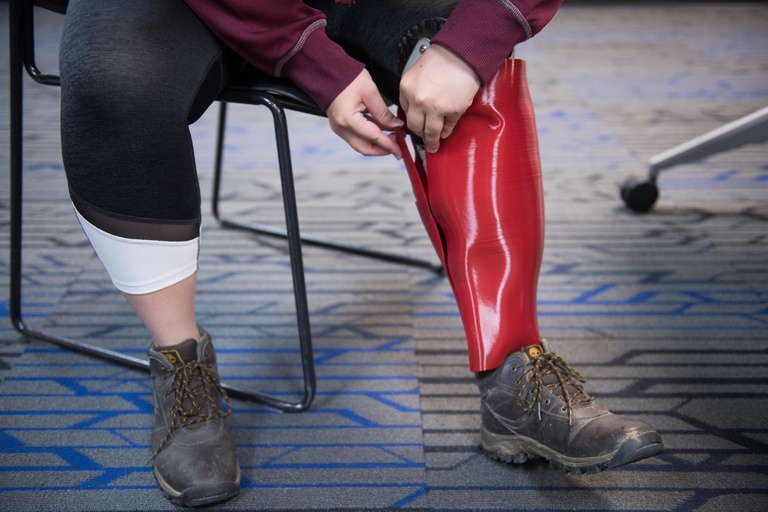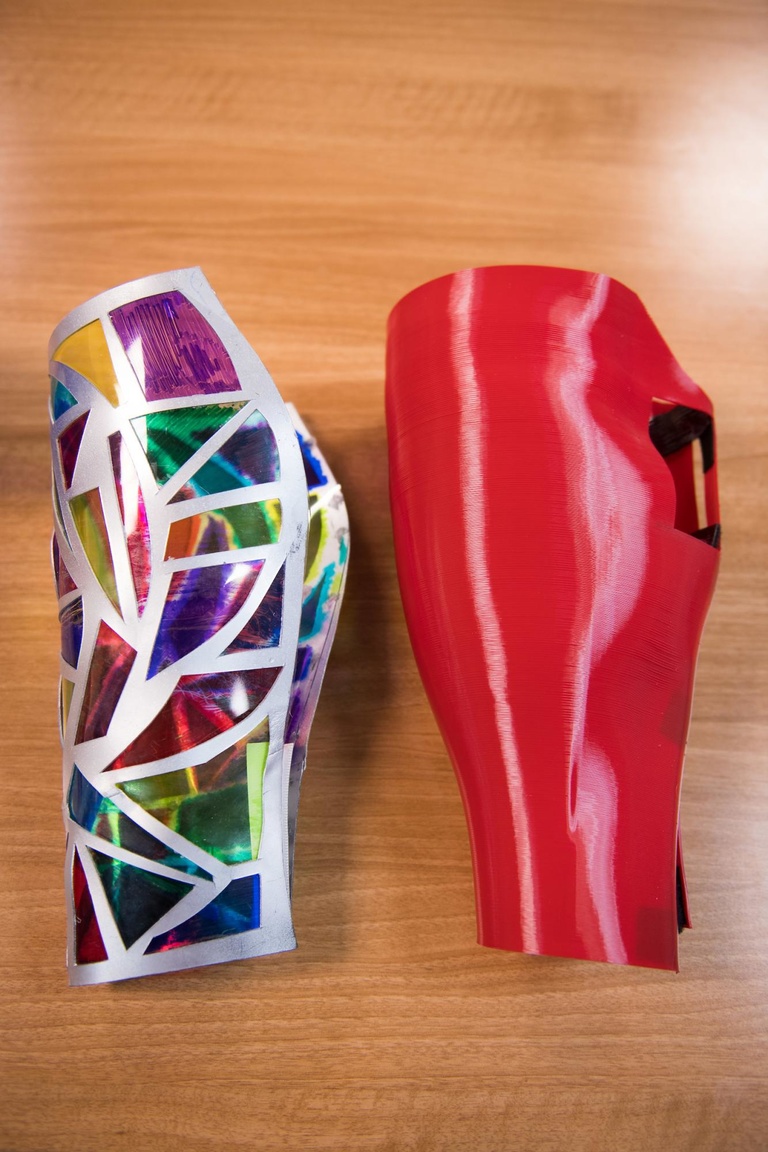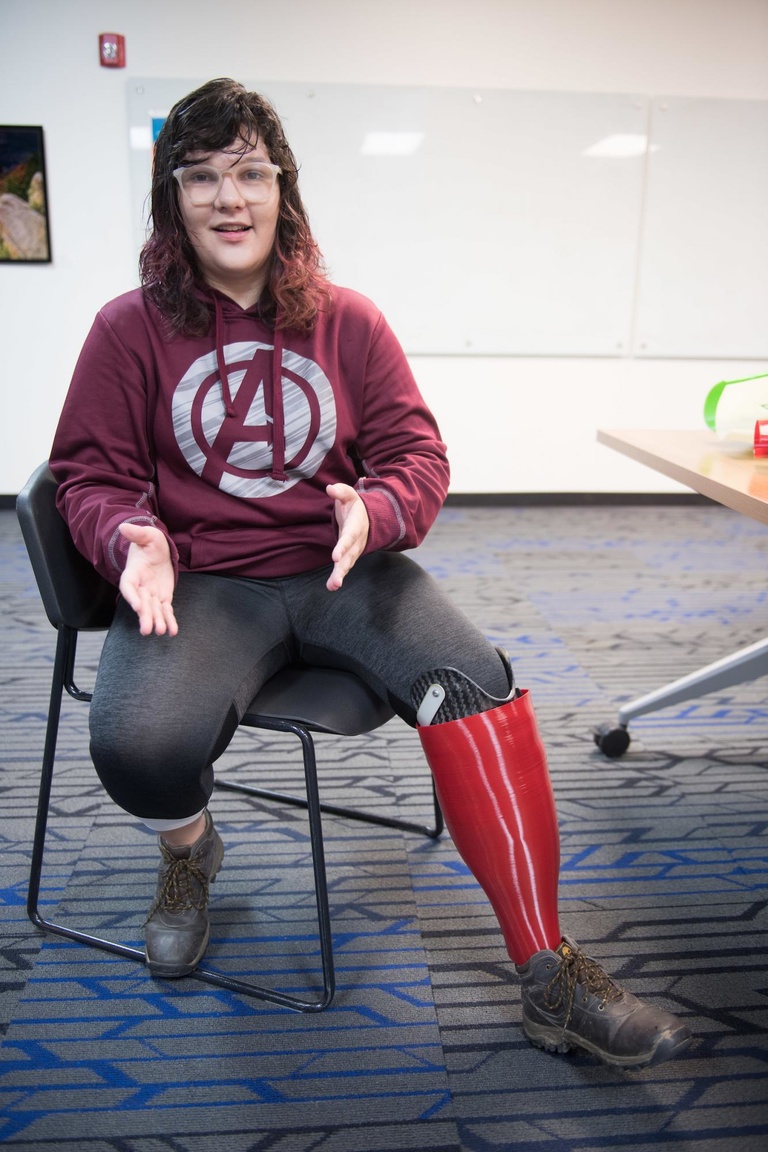Erica Cole doesn’t let anything diminish her zest for life.
Not even losing a leg.
Cole’s first three years as a chemistry major at the University of Iowa were filled with success—her research published in a peer-reviewed scientific journal as a sophomore, she landed a prestigious U.S. Department of Energy-funded internship, she served as a costume designer for theatrical productions, and was a member of the UI Spirit Squad who designed new costumes for Herky.
Her future was bright and limitless, until May 2018 when her car was T-boned at an intersection in Colorado and her left leg was so badly injured that it was amputated later that day.
Yet her future remains as bright and limitless as ever, nearly a year after the accident. In fact, it might be even more so because the injury and her innate optimism led her curious mind in new directions and to a future as an entrepreneur.
“When I think about Erica, the last thing that I think of is that she’s been injured,” says Kimm Harris, who teaches entrepreneurialism in the UI’s John Pappajohn Entrepreneurial Center (Iowa JPEC) and is helping Cole start a new business that manufactures decorative covers for prosthetic legs. “She took what for so many people would be a tragedy and turned it into a problem-solving opportunity.
No Limbits
To learn more about Erica Cole's company, go to www.no-limbits.com.
“Her future is really bright, and she’ll help so many people,” says Harris.
Despite the severity of her injury, Cole, who is from Cedar Rapids, Iowa, has managed to keep moving forward. After a few months of adjustment, first to the injury and then to the prosthetic leg she began wearing to improve her mobility, she didn’t skip a beat and returned to campus to start her senior year. She went to classes, looked at graduate schools, considered applying for a Fulbright fellowship—all things she says she would have done before the accident.
The biggest change, and the one that bothered her the most, was how others reacted to her.
“There was a difference in the way people were treating me,” Cole says. “They were looking at me with sympathy and asking questions I didn’t want to answer every day.”
She didn’t want the loss of a leg to define her, for people to look at her and see only what she no longer had. So she invented a plastic cover that snaps over her prosthetic leg, designed using the imagination that led her to create new clothes for Herky. What so many people saw as a negative was now joyful and positive.
“That really changed the conversation,” she says. “Now, they weren’t saying ‘I’m so sorry,’ they were saying ‘That’s so cool. Where did you get it?’”
Eventually someone suggested she start a business designing, making, and selling the prosthetic covers. She’d never considered starting a business before, but she didn’t immediately dismiss the idea—after all, she’d been trying all kinds of new things since the accident.
If anything, the accident motivated her to try as many new things as possible, realizing now that there are no guarantees in life. She took classes for improv acting and ballroom dancing and scuba diving. She applied to graduate schools she’d been looking at. And she finished her Fulbright application, a proposal to study the teeth of wild boars captured around the Fukushima nuclear plant in Japan to track the spread of strontium since the facility started spewing radioactivity after it was destroyed by an earthquake and tidal wave in 2011.
So starting a business designing, manufacturing, and selling prosthetic leg covers? Sure, no sweat.
At her roommate’s suggestion, she entered a contest called Idea Storm, sponsored by Iowa JPEC in October 2018. Novice entrepreneurs describe their business idea to a panel of judges that awards start-up capital to the best presentations. Cole did so well that she was motivated to participate in the Iowa Startup Games later that month, another JPEC-sponsored contest where entrepreneurs work with coaches and mentors to create a business plan in a weekend, with the best plans receiving more start-up cash.
She discovered about 2 million amputees live in the U.S., a decent-sized market for her product. And while competition for her product exists, she has a significant price advantage because she plans to make hers less expensively using a 3-D printer. Cole also talked with potential customers, all of whom liked the idea of a cover for their prostheses.
Suddenly, starting a business seemed plausible. Cole joined the Founder’s Club—an Iowa JPEC program that provides a wide network of coaching, mentoring, educational programs, and funding opportunities—and met Harris, her entrepreneurial advisor.
“She’s been on a fast track because she received so much positive feedback from potential customers and from other entrepreneurs that it pushed her along,” says Harris. “She had no idea what to do at the start, but she’s not afraid to ask questions and she shows a willingness to try anything, which is a great characteristic of an entrepreneur.
“And she’s been taking advantage of everything Iowa JPEC has to offer,” Harris says.
Cole calls her business No Limbits, and she opened an office in the UI’s Merge co-working space in downtown Iowa City, where she’s surrounded by mentors, coaches, and other entrepreneurs who inspire her. She worked through the winter to raise more start-up capital, including a GoFundMe campaign. She settled on a compound to manufacture the covers—PETG, tough enough they won’t break, “unless you’re kickboxing in them.” She purchased 3-D printers to manufacture the covers and devised a logistics system to ship them. Her website went live in April, at www.no-limbits.com.
Cole’s already looking to expand her product line, thinking about blank covers made of material similar to a white board so people can use markers to draw on them whatever they wish.
“They can be used for protection and creative expression,” she says. “People can choose different colors and designs. They can be like a pair of shoes; you can change them to match what you’re wearing or how you’re feeling.”
Her JPEC experience also connected with her George Daniel, a 2016 UI graduate who owns the Minneapolis-based Universal Prosthetics. The two met when he was a coach at the Iowa Startup Games in October 2018, and he’s served as a mentor since.
“One of the most important characteristics of a successful entrepreneur is resilience, and she obviously has that in spades, the way she’s bounced back from her accident,” Daniel says. “As for her business, she’s been making terrific progress so far and has gotten a lot of traction in just a few months.”
Daniel acknowledges that Cole’s road will be challenging, but says she has the tenacity and drive to make it work.
“She’s also started her business for the right reasons,” Daniel says. “She wants to solve a problem, not just for herself, but for other people too. She’s not doing this to get rich.”
Cole admits that the post-accident trauma was difficult. She remembers ambulances and emergency workers and flashing lights at the accident scene—and then nothing until she woke up in a hospital feeling relieved to be alive. She sensed something was wrong but she couldn’t figure out what, and nobody told her about the amputation for some time afterward.
She went through dark periods and struggled to adjust to life with one leg.
“I had moments that were hard for me,” she says. “It’s the little things that are the most difficult, things that were so simple before.”
But, she says she kept thinking, it was just one leg. The rest of her still worked just fine. And she knows she still has options in life. She can get her PhD in chemistry. She can win a Fulbright (she’s been announced as a semifinalist). And she can manage her own business.
No Limbits, it turns out, has become a form of therapy. Not only did it give Cole something to think about besides self-pity, her market research and customer discovery put her in touch with other amputees whose own stories lift her spirits.
“I talked with so many other amputees that I was able to see all the things that they can do, and it’s so inspiring,” she says. “Now, I’m going to do things because I realize I might not be able to do it later.
“I’m a lot happier now because of it,” she says. “I wouldn’t be able to do any of it without JPEC. So many people have taken me under their wing, it suddenly became possible for me to start my own business.”


